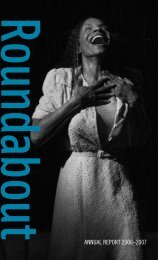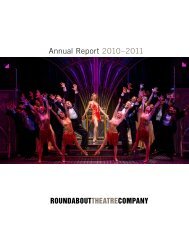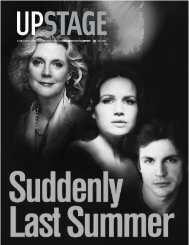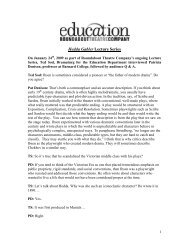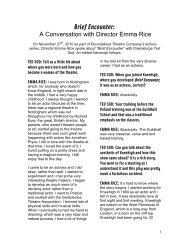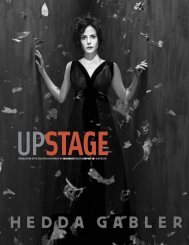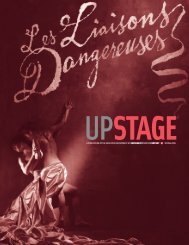The Language of Trees - Roundabout Theatre Company
The Language of Trees - Roundabout Theatre Company
The Language of Trees - Roundabout Theatre Company
You also want an ePaper? Increase the reach of your titles
YUMPU automatically turns print PDFs into web optimized ePapers that Google loves.
And in casting Gio, who is an adult actor playing a<br />
seven year old, which is called for in the script, was<br />
there a specific thing you needed for him?<br />
AT: I think we were so lucky to find Gio. <strong>The</strong> part<br />
demands an innocence and a certain kind <strong>of</strong> pain. <strong>The</strong><br />
character is somehow wounded on the inside from the<br />
very beginning, and there’s something about Gio that’s<br />
just so warm and open, and yet there’s also something<br />
very fragile and possibly dangerous or sad about him.<br />
He was just perfect when he came in. You believed him.<br />
He wasn’t playing at the part, he was fully inhabiting it.<br />
It was really lucky to find him.<br />
Can you tell us something about your vision?<br />
AT: To me what’s essential to the play is this idea <strong>of</strong><br />
loss and what it takes to move beyond loss and grief.<br />
What we’ve tried to do scenically is create three<br />
different spaces, three different areas, and there is this<br />
tree that reaches through all these areas to connect<br />
them. Hopefully, it will be the big visual metaphor that<br />
lands at the end. Cameron has had a cool idea <strong>of</strong> a kind<br />
<strong>of</strong> vessel <strong>of</strong> a tree. She’s taken the hugging tree and<br />
related it to the sand so it’s a tree that fills with sand<br />
and the sand filling the tree is something that is used as<br />
a form <strong>of</strong> communication. It is the murmuring, but it’s<br />
also a suffocating gesture.<br />
possibilities open and be receptive to trying any<br />
different opportunity in the theatre. Seeing as much<br />
theatre and being around actual pr<strong>of</strong>essional theatre is<br />
the best thing you can do as a young person.<br />
SL: Working at Playwrights Horizons for a year and a<br />
half was invaluable because all I did was read plays all<br />
day long. I had to leave that job ultimately because it<br />
became hard to try to create work and also evaluate it in<br />
a critical way. But reading plays and seeing plays are<br />
just so important. Just being around other people and<br />
being part <strong>of</strong> the conversation. Learning where you fit<br />
in and getting to see all sorts <strong>of</strong> things like Hell House<br />
at St. Anne’s Warehouse and then going to see<br />
something at <strong>Roundabout</strong> or on Broadway. It’s<br />
important because you see the kind <strong>of</strong> work you want to<br />
be doing and you also see if the kind <strong>of</strong> work you want<br />
to do isn’t there yet.<br />
SL: I should also say when I’m writing I don’t think<br />
about the stage itself. I don’t have a very proprietary<br />
sense <strong>of</strong> what I need it to look like. Part <strong>of</strong> what’s so<br />
exciting, about Alex specifically, is he has such a visual<br />
sense. I just love handing it over to Alex and the<br />
designers and seeing what they come up with.<br />
AT: And if this show is successful, it will receive many<br />
productions all around the United States, just as is<br />
happening with Speech and Debate. And I’m sure no<br />
one will stage the show the way we’re staging it here. I<br />
mean this show is so open to many different visual<br />
interpretations. It’s going to be thrilling to see those<br />
other productions.<br />
(Actors; Michael Warner and Michael Hayden)<br />
We have a lot <strong>of</strong> young people participating in our<br />
education programs who want to write and direct.<br />
What would you say to a high school or middle<br />
school student who had those aspirations?<br />
AT: See as much work as you can, and intern at as many<br />
theatres and nonpr<strong>of</strong>its and things like that. My first<br />
job out <strong>of</strong> college was interning at the Manhattan<br />
<strong>The</strong>atre Club. I knew I wanted to be involved somehow<br />
in theatre, but I thought possibly as an actor or as an<br />
administrator, and then I decided to be a director. It<br />
didn’t mean that any <strong>of</strong> the work I had done trying to be<br />
an actor was down the drain. Just keep all the<br />
UPSTAGE FALL 2008 <strong>The</strong> <strong>Language</strong> <strong>of</strong> <strong>Trees</strong><br />
4






